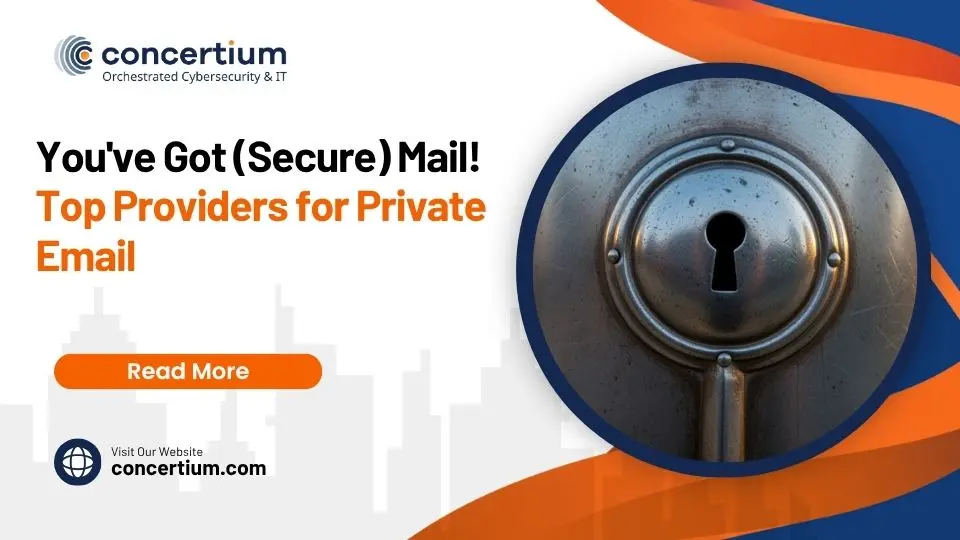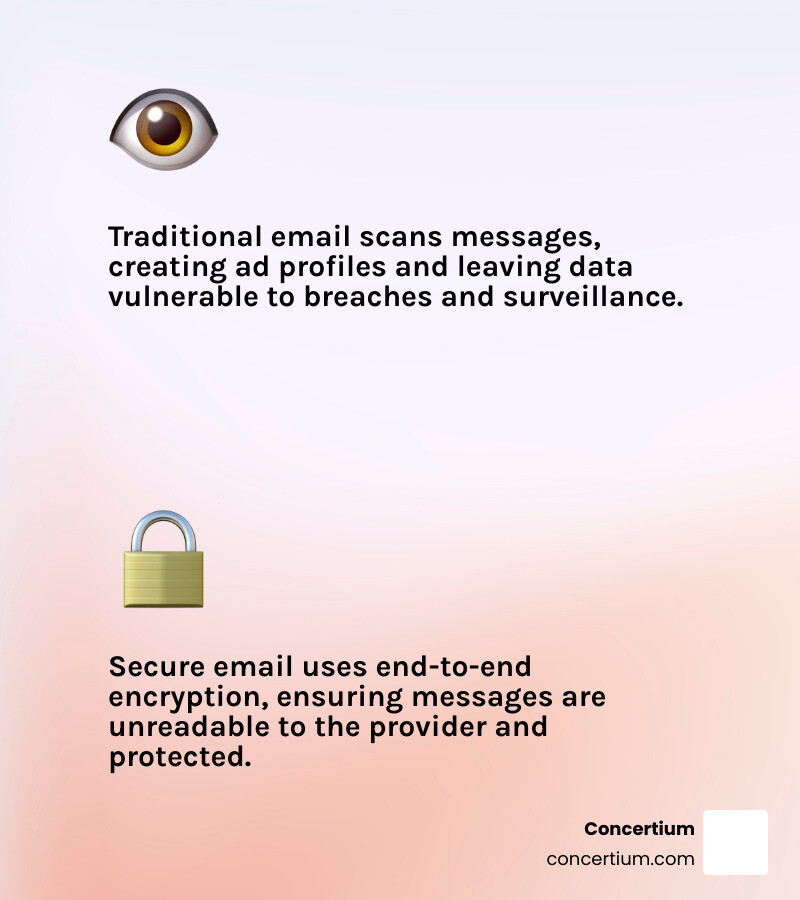AI Overview:
Your everyday email isn’t as private as you think. Mainstream services like Gmail and Yahoo scan your messages to build advertising profiles and even share data with third parties. Secure email providers fix this by using end-to-end encryption—ensuring only you and your intended recipient can read your messages.
Secure Email Providers: Top 5 for Data Protection
Why Your Email Isn’t as Private as You Think
Secure email providers offer encrypted communication that protects your messages from hackers, government surveillance, and data mining. Unlike traditional services that scan your messages for profit, secure providers use end-to-end encryption to ensure only you and your recipient can read your emails.
Top secure email providers include:
- Proton Mail – Swiss-based with 100+ million users, offers 1GB free storage
- Tuta Mail – German provider with quantum-safe encryption, 1GB free storage
- Mailfence – Belgian service with OpenPGP support, 500MB free storage
- StartMail – Netherlands-based with unlimited aliases, 7-day free trial
- Posteo – Sustainable German provider at €1/month, 2GB storage
Services like Gmail, Outlook, and Yahoo Mail actively scan your emails to build advertising profiles and track your behavior. As one privacy expert noted, “Hoping that big free email providers…won’t read your messages and use what they find for their own purposes, is largely naive.”
This goes beyond advertising. Your email contains sensitive financial, health, and business information. Traditional providers often store this data unencrypted, making it vulnerable to data breaches and surveillance.
With increasingly sophisticated cyber threats and massive data breaches, protecting your communications is critical. For business owners, the risks to customer data, trade secrets, and compliance are especially high.
Secure email providers offer a straightforward solution. They use military-grade encryption to protect your messages in transit and at rest. Because they can’t read your emails, your data remains private, often protected by strong privacy laws in countries like Switzerland and Germany.
Explore more about secure email providers:
Why Make the Switch? The Benefits of Secure Email Over Traditional Services
Gmail, Yahoo, AOL, and other mainstream providers actively scan every email you send and receive. They treat your inbox—containing medical results, bank statements, and business contracts—as a data source for advertising profiles. This surveillance is extensive; Gmail was caught giving third parties full access to user emails and tracking all of your purchases, while Yahoo admitted to scanning emails in real-time for US surveillance agencies.
The fundamental problem is that these services are “free” because you are the product. Your personal communications fund their advertising empires. Secure email providers operate on a different model, prioritizing your privacy over data mining. While this may involve a small monthly fee, you gain genuine security in return.
However, even encrypted email has limitations. Metadata—information like who you’re emailing and when—can still be visible. Subject lines also often remain unencrypted. While your message content is private, your communication patterns may not be completely hidden.
What Sets Secure Email Apart?
Secure email is like a safety deposit box compared to a traditional provider’s glass display case. Key differences include:
- End-to-End Encryption: Your messages are scrambled into unreadable code on your device and can only be decrypted by the intended recipient.
- Zero-Access Architecture: The provider cannot decrypt or read your messages, even if compelled by a court order. They don’t have the key.
- Ad-Free Experience: An ad-free inbox signifies that your emails are not being scanned for advertising keywords.
- User Ownership of Data: You are the customer, not the product. The provider’s success depends on keeping your data secure, not selling it.
The Pitfalls of Mainstream Email Platforms
Traditional email platforms have business models that conflict with user privacy. Features like Gmail’s Smart Reply and automated calendar integration work by analyzing every message you receive. This automated content analysis categorizes your interests and builds detailed behavioral profiles.
This constant monitoring, sometimes in real-time for government surveillance, means your most sensitive communications become training data for AI, fodder for targeted ads, and potential evidence in investigations. The result is a near-total lack of genuine user privacy.
Core Security Features to Look for in a Secure Email Solution
When choosing secure email providers, look for a digital fortress built on essential features: rock-solid encryption, a privacy-friendly legal jurisdiction, transparent open-source code, and robust two-factor authentication. These elements separate truly secure services from those that merely claim to be private.
Understanding End-to-End Encryption and Zero-Access Security
End-to-end encryption (E2EE) is the gold standard. It scrambles a message on your device before it’s sent, making it unreadable to anyone without the correct key. This relies on a public and private key infrastructure: you share your public key for receiving encrypted mail, but only your private key, stored on your device, can decrypt it.
Zero-access encryption (or the zero-knowledge principle) means the provider cannot read your emails. Even if court-ordered, they have nothing to hand over, as they don’t possess the decryption keys. Proton Mail is a key example of this architecture.
Common encryption protocols include PGP (Pretty Good Privacy), AES (Advanced Encryption Standard), and RSA. Tuta Mail combines AES and RSA for a robust security framework.
However, be aware of limitations. Metadata, such as sender/recipient addresses and timestamps, often remains unencrypted. Some services, like Tuta Mail, encrypt subject lines, while others using standard PGP do not.
The Role of Jurisdiction and Privacy Laws
Your provider’s location matters. Privacy-friendly jurisdictions like Switzerland (Proton Mail), Germany (Tuta Mail), and Belgium (Mailfence) have strong data protection laws (like GDPR) that treat privacy as a fundamental right.
Conversely, countries in the Five Eyes alliance (USA, UK, Canada, Australia, New Zealand) share intelligence, potentially giving multiple governments access to data stored in one member country. This legal landscape led to the shutdown of Lavabit, which refused to compromise user security for US authorities.
U.S. data privacy considerations are significant, as laws can compel companies to hand over user data, sometimes with gag orders. This makes jurisdiction a critical factor in your choice.
Comparing Free vs. Paid Secure Email Plans
Most secure email providers offer free and paid tiers. Free plans are great for personal use but come with limitations.
- Storage: Free plans offer limited storage (e.g., 500MB-1GB), while paid plans can provide 20GB to 1TB or more.
- Custom Domains: Essential for businesses (e.g., yourname@yourdomain.com), this feature is almost always exclusive to paid plans.
- Email Aliases: Paid plans offer more or unlimited aliases to help manage spam and organize your digital life.
- Support & Advanced Features: Paid users get priority support and access to tools like custom filters, auto-replies, and integrated calendars or document storage.
As Carole Howard from Beyond Encryption notes, “While storage is abundant with some providers, always consider the trade-offs like security and user experience.” Paying for email aligns the provider’s interests with yours: their success depends on your security, not on selling your data.
Matching Secure Email Features to User Needs
Different users have different security needs. A journalist protecting sources requires different features than a small business or a family sharing photos. Choosing the right secure email providers means matching their offerings to your specific use case. As Adam Byford of Beyond Encryption says, “It’s essential to choose an email service that aligns with your daily workflow and security needs.”
For Maximum Privacy and Anonymity
For high-risk users like activists or whistleblowers, focus on these features:
- Open-Source Code: Allows for independent security audits to verify there are no hidden backdoors (offered by Proton Mail, Tuta Mail).
- Anonymous Payment Options: Providers like Posteo accept payment by mail, allowing for a truly anonymous account.
- No-Logs Policies: Ensures minimal data is stored about your activity. Posteo strips IP addresses from messages and keeps no connection logs.
- Post-Quantum Cryptography: Tuta Mail offers encryption protocols designed to resist future threats from quantum computers.
For Business and Enterprise Requirements
Businesses need strong security without sacrificing productivity. Key features include:
- Regulatory Compliance: Look for providers that meet standards like HIPAA (Hushmail) or GDPR, HIPAA, and PCI (Kolab Now).
- Custom Domains: Use a professional address like info@yourcompany.com to build brand trust. This is standard in most paid plans.
- User Management Tools: Easily add, remove, and manage permissions for employee accounts and encryption keys.
- Secure Collaboration Features: Integrated and encrypted calendars, document storage, and group sharing keep your entire workflow secure. Mailfence excels in this area.
For Everyday Users and Easy Adoption
Switching to secure email can be simple. Look for providers focused on usability:
- User-Friendly Interfaces: Many services, like Proton Mail, offer an experience similar to Gmail, making the transition seamless.
- Mobile and Web Apps: Access your secure email from any device. Mailfence also offers a progressive web app for a native-like browser experience.
- Simple Migration Tools: Services like Proton Mail’s “Easy Switch” help you transfer existing emails and contacts without hassle.
- Password-Protected Messages: Send encrypted messages to users on non-secure platforms via a secure web link and a shared password.
Beyond the Inbox: Advanced Features and Best Practices
Choosing one of the top secure email providers is your first step. To maximize your privacy, leverage advanced features and adopt smart security habits.
Innovations in Secure Email Technology
Leading providers are constantly innovating with features like:
- Quantum-Resistant Encryption: Tuta Mail uses post-quantum cryptography to safeguard against future threats.
- AI-Powered Threat Detection: AI can spot phishing and malware without reading your emails.
- Encrypted Chat: Some platforms integrate secure instant messaging.
- Self-Destructing Messages & Attachments: Set emails and files to be automatically deleted after a specific time.
- Blockchain-Based Key Transparency: Proton Mail uses blockchain to create a tamper-proof public key directory, preventing impersonation attacks.
How to Transition to a Secure Email Solution
Switching doesn’t have to be difficult. Follow these steps:
- Research providers that match your needs (e.g., Proton Mail for usability, Tuta Mail for quantum safety).
- Create an account. Most offer free tiers for testing.
- Import contacts and messages. Use tools like Proton Mail’s Import-Export app to simplify the process.
- Notify your contacts about your new secure address, starting with the most important ones.
- Update linked accounts for banking, shopping, and other services.
- Delete old accounts once you are confident the migration is complete.
Best Practices for Email Security
Your habits are as important as your provider’s technology. Always:
- Use strong, unique passwords for every account, managed with a password manager.
- Enable two-factor authentication (2FA) for an essential extra layer of security.
- Verify recipient identities before sending sensitive information.
- Be cautious with links and attachments to avoid phishing. Proton Mail’s Tracking Links Protection can help.
- Secure your devices with antivirus software and full-disk encryption.
- Use a VPN like Proton VPN to mask your IP address and encrypt your internet traffic.
- Regularly review privacy settings on all your accounts.
Frequently Asked Questions about Secure Email
It’s natural to have questions when considering a switch to encrypted email. Here are answers to the most common concerns about secure email providers.
Can encrypted emails be compromised?
While end-to-end encryption is incredibly strong, no system is 100% foolproof. The content of your emails is protected, but vulnerabilities can exist. The primary risks are not from breaking the encryption itself, but from: Social Engineering: An attacker tricks you into revealing your password or recovery phrase through phishing.
Compromised Devices: If your computer or phone has malware, an attacker could potentially access your private keys and decrypt messages.
Private Key Security: If you don't protect your private key, your entire encrypted history is at risk.
Metadata Exposure: Information like who you email, when, and the subject line may not be encrypted, revealing communication patterns. Combining a secure service with good security habits provides protection far superior to traditional email.
Is it worth investing in a paid secure email plan?
For most users serious about privacy, yes. Free plans are excellent for trial, but paid plans (often just $2-5 per month) open up the full potential of secure email providers. Key benefits include:
More Storage: Paid plans offer significantly more space, from 20GB to 1TB or more, compared to the 1GB or less on free tiers.
Custom Domains: Use a professional address like yourname@yourbusiness.com.
More Aliases: Create multiple addresses to organize your inbox and reduce spam.
Advanced Features: Access custom filters, auto-responders, integrated calendars, and priority customer support.
Your subscription also supports a business model built on privacy, not data monetization.
How does a provider's location affect email privacy?
A provider's location is as important as its technology because it dictates the laws it must follow.
Countries with strong privacy laws, like Switzerland (Proton Mail) and Germany (Tuta Mail), offer robust legal protection for your data and are not part of major surveillance agreements.
International surveillance alliances like the Five Eyes (USA, UK, Canada, Australia, New Zealand) allow member governments to share intelligence, creating risks for data stored within those jurisdictions.
Legal precedent shows why this matters. The US-based service Lavabit was forced to shut down rather than compromise user security under government pressure.
Choosing a provider in a privacy-friendly country adds a crucial layer of legal protection to your technical security.
Conclusion
In an era of constant data breaches and surveillance capitalism, taking control of your email privacy is essential. Traditional services like Gmail treat your personal messages as a product to be monetized. In contrast, secure email providers like Proton Mail, Tuta Mail, and Mailfence use end-to-end encryption to ensure only you and your recipient can read your messages.
Whether you’re a business professional, a journalist, or simply a private citizen, these services offer the tools you need to protect your communications. Making the switch is straightforward—start with a free account, migrate your important contacts, and enjoy the peace of mind that comes with genuine digital privacy.
Email security is a critical piece of a larger cybersecurity puzzle. At Concertium, we complement personal privacy efforts with enterprise-grade cybersecurity services. With nearly 30 years of expertise, our AI-improved threat detection and automated response systems help organizations build comprehensive security frameworks for today’s evolving threats.
Your journey toward better digital privacy starts now. Secure email is an excellent first step.
Take our email security quiz to assess your risk






